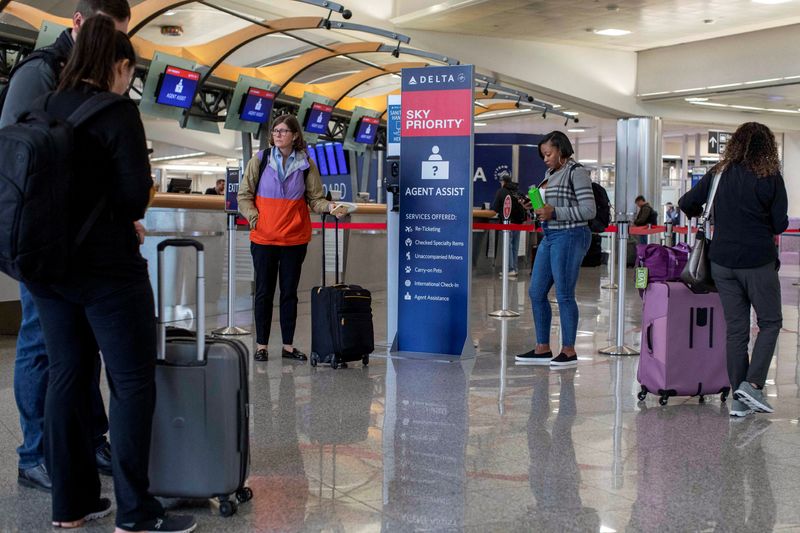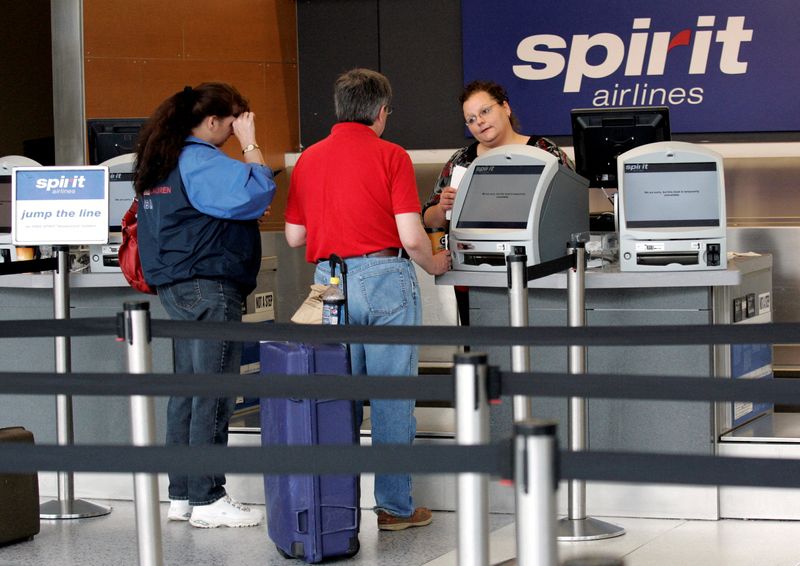By Rajesh Kumar Singh
CHICAGO (Reuters) - Travel boom has delivered bumper earnings for U.S. carriers, but no-frills airlines such as Frontier and Spirit are struggling to return to sustainable profitability.
That has made some of them weigh premium-price offerings, including first-class seats, customer lounges and branded foods even as they expect fares to remain the primary driver for bookings.
Ultra low-cost carriers offer a no-frills experience at rock-bottom fares and charge heavily for ancillary services.
They were tipped to be the big winners after the pandemic, but persistent operational constraints have exacerbated their cost pressures, making it imperative to find new high-margin revenue streams.
With consumers more willing to splurge on travel, demand for premium cabins has gone up. This together with soaring bookings for flights to Europe and Asia have allowed the legacy airlines - Delta, United and American - to mitigate inflationary pressures.
Budget carriers lack these products.
Frontier CEO Barry Biffle said while he will not invest in long-haul jets, he has been struck by a greater desire among leisure travelers to pay for first-class seats on domestic flights.
Frontier is watching the trend "very carefully" and would consider adding premium seats if it lasts for multiple years, he said.
"If people are really willing to pay that much for a premium, maybe there is an opportunity," Biffle told Reuters.
Similarly, Minneapolis-based ultra-low-cost carrier Sun Country is contemplating opening an airport lounge and offering branded food and beverage. CEO Jude Bricker said the demand for services that offer even minor improvements to the travel experience has doubled.
"We're in discussions about things that I would have written off in the past," Bricker said.
These offerings, however, entail a dilution of the traditional no-frills business model that powered the earnings of budget carriers before the pandemic. They also run the risk of inflating costs.
Frontier's Biffle called adding premium seats a "big decision" and a "fairly expensive" move. That's why he is not ready to change Frontier's business model "overnight."
In the meantime, he is doubling down on costs. Frontier plans to rework its network to allow almost all of its planes to return to their stations every night, with a goal to contain disruptions and save money.
OPERATIONAL CONSTRAINTS
No-frills carriers operate a single fleet, fly their aircraft longer each day, and put more seats on every plane.
Operational constraints have upended that playbook. A shortage of air-traffic controllers has marred Frontier's operations. Sun Country is grappling with a shortfall of captains. Spirit has been forced to ground several planes due to RTX's engine problem.
As a result, ultra low-cost carriers have not been able to fully utilize their fleets - a strategy they relied upon before the pandemic to lower operating costs and boost profits.
Meanwhile, surging pilot pay rates have ballooned costs. Privately-owned Avelo Airlines has seen a 75% jump in its pilot wage bill in the past two years. The bill is expected to increase by another 10% following hefty pay raises at major carriers, CEO Andrew Levy said.
Weakening pricing power in their domestic market, as well as a jump in fuel prices, have only added to their troubles.
Biffle last week said Frontier is facing pressure to offer "very, very low" fares to fill up its planes. Spirit has cut its profit outlook for the current quarter, citing "heightened promotional activity with steep discounting."
Frontier's shares are down by half this year. Spirit shares are down 18%. In contrast, shares of United and Delta are up 20%, and American's shares have gained 5%.
The divergence in performance has sparked questions about the business model of low cost, low fares.
United Airlines CEO Scott Kirby (NYSE:KEX) has called the model "doomed" as he doesn't expect the constraints would go away anytime soon. Some analysts are also calling for a review.
"I don't know that the model is completely broken, but I certainly think that it needs to be rethought," said Helane Becker, airline analyst at TD Cowen.
PRICE-SENSITIVE TRAVELERS
CEOs of budget carriers, however, don't see the model losing its appeal as long as fares determine travel bookings. The share of discount carriers in domestic passenger traffic has gone up after the pandemic, data from trade group Airlines for America shows, thanks to travelers like Jacob Brown.

The 23-year-old Denver-based school teacher calls himself a "big fan" of ultra-low-cost airlines. He has been using Frontier's unlimited $140 monthly flight pass, which he said translates into an average one-way fare of about $15.
"I can't afford to fly Delta enough on my measly salary," Brown said. "But I can afford to fly budget carriers."
